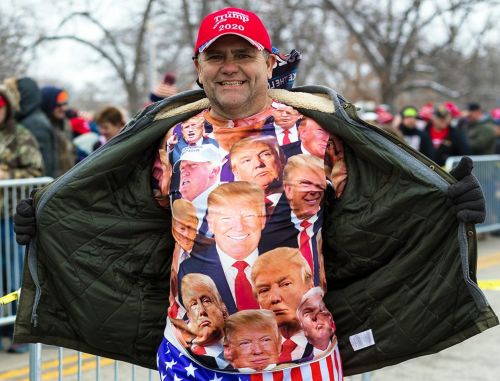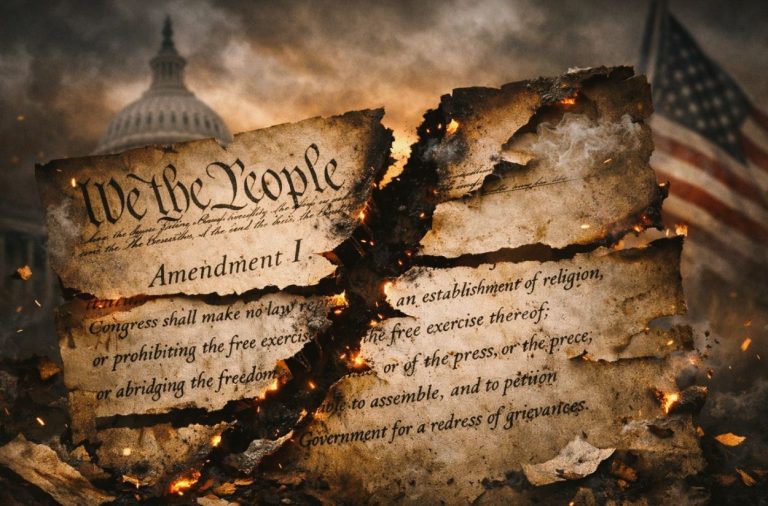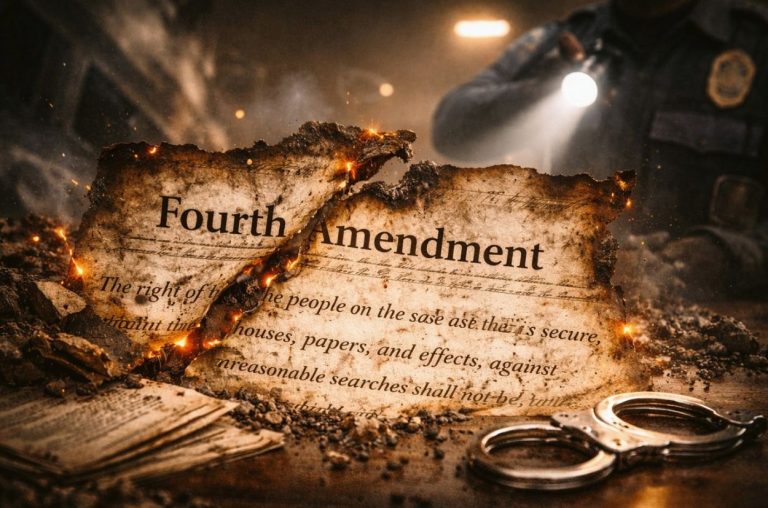

If a democratic political following begins to behave like a religious one, then the boundaries of power shift. Civic dissent becomes heresy.

By Matthew A. McIntosh
Public Historian
Brewminate
Introduction: The Politics of Devotion
In a rally early this year, Donald Trump stood before thousands of red-cap-wearing supporters and delivered a message that went far beyond normal campaign rhetoric. He said, “I’d like to think that God saved me for a purpose,” framing his survival of a July 2024 assassination attempt not merely as luck or fortune, but as part of a divinely ordained mission.
That moment encapsulates a deeper shift: what began as a political movement has increasingly assumed qualities more akin to a religious following. The familiar language of voters and power is being replaced by the language of devotion, revelation and unquestioning loyalty.
What follows argues that Trump’s leadership style and the culture around it echo many of the hallmarks of modern cultic movements: a charismatic figure cast as uniquely chosen, followers who display near-absolute obedience, sweeping promises of deliverance, and a worldview structured around faith rather than policy. Across charisma, obedience, prophecy and cognitive inversion, the parallels deserve serious scrutiny, especially given the stakes for democracy when political commitment begins to mirror religious fervor.
Amid the spectacle of loud rallies and viral videos, including the widely circulated “God Made Trump” montage video that cast Trump as a messiah-figure. It becomes necessary to ask: what happens when political leadership is treated not as a public service, but as an act of worship?
Charisma and the Cult of Personality
There’s a fundamental reason why the phrase “cult of personality” is increasingly used to describe Donald Trump and his movement: his allure is not simply political prominence, but something more visceral. Scholarly analysis points out that Trump exerts “charismatic authority,” the kind of leadership where a figure is perceived as exceptional, above the ordinary rules, and worthy of devotion. In one academic essay titled “Donald Trump, Charismatic Leadership and the ‘Deep State’”, the author positions Trump as symptomatic of a broader democratic crisis rooted in precisely this kind of authority.
The nature of this charisma is multi-layered. One study of Trump’s most ardent supporters found they display personality traits often associated with what might be called “cult-like support.” Researchers discovered that such followers scored unusually high on measures of conscientiousness, a trait linked to order, dutifulness and self-discipline. At the same time, another analysis describes Trump’s appeal as rooted in what the author calls a “carnivalesque” style: transgressive, norm-shattering, theatrical.
What does that look like in practice? One observer writes that Trump’s charisma works because it leverages “elation rather than facts.” This can be seen when he says things like, “I could stand in the middle of Fifth Avenue and shoot somebody and I wouldn’t lose voters,” words that suggest immunity for the chosen one and rally around the bold breach of convention. (He did in fact make that statement in 2016.)
This charismatic portrait resonates with classical sociologist Max Weber’s category of “charismatic authority,” wherein legitimacy is derived not from formal rules or tradition but from the proclaimed exceptional qualities of the leader. Trump’s rhetoric, “I alone can fix it,” “they’re coming after me and therefore they’re coming after you,” positions him as the exception, the singular agent of change.
But why is this significant in the context of cult-leadership patterns? Because charisma of this sort tends to foster identification rather than mere support, and that opens the door to unconditional loyalty. A leader is not followed simply for policies, but for the meaning they represent. In this way, the Trump persona, often portrayed as the outsider, the disruptor of elites, becomes a vessel for belonging, identity, and, crucially, the expectation of fidelity.
Trump’s charisma is more than charm or media skill; it is a foundation for devotion. It transforms his public persona into a symbol around which a movement organizes, and in that transformation, the line between political campaign and cult-like followership begins to blur.
Obedience and the Loss of Individual Judgment
Unconditional loyalty is an unmistakable hallmark of many cult-like movements, and in the case of Donald Trump one can observe patterns that raise precisely this concern. The willingness of large swathes of his base to privilege him over institutional norms or independent judgment signals the erosion of individual critical thought.
One extensive survey by the Public Religion Research Institute found that four in ten Americans are susceptible to authoritarian appeals, a figure that jumps to roughly two-thirds of Republicans and white evangelical Protestants, demographics heavily aligned with Trump support. This suggests not just intense affinity for the leader, but a mindset receptive to obedience and centralized command.
Additionally, research into the psychological disposition of Trump’s followers reveals a significant correlation between support for him and authoritarian-type attitudes: greater deference to authority, less tolerance for dissent, and a preference for order over deliberation. For instance, in one academic article examining “social-psychological perspectives on Trump supporters,” the author notes that the dynamic appears less about policy alignment and more about identity and belonging, features that facilitate obedience.
Why does this matter? Because cult leaders don’t simply issue policy platforms: they require loyalty, not agreement. They test followers’ attachments by asking them to back symbolic or actual transgressions. In Trump’s case, the ascension of demands such as “Stop the steal” and referendum-style support for him in conflicts involving law enforcement, judicial decisions, or norms suggest a shift from supporting a public servant to following a figure around whom a movement circles.
While polling shows that a large majority still believes the presidency must follow the law and defer to institutions such as the Supreme Court of the United States, the significance lies in how partisans interpret those requirements. A recent poll found that while some 80% of Republicans say the president “must obey” a Supreme Court ruling, 20% believe the president has the power to ignore such a ruling, a non-negligible minority. That minority reflects the kind of exception-thinking present in cult-loyal groups: the leader is seen as standing above the rules.
In the cult-model, this dynamic is reinforced when followers rationalize or ignore the leader’s contradictory actions, moral failings or legal jeopardy, not because they don’t know about them, but because their attachment is rooted in belief rather than evaluation. The result is a community where obedience supersedes challenge, and the individual’s judgment is outsourced to the leader’s will.
The patterns of obedience among Trump’s followers, especially their prioritization of him over institutions or norms, mirror the structural demands of cult-systems, which thrive not on reasoned persuasion but on devotion and uncritical allegiance.
Prophecy, Promises, and the Apocalyptic Frame
In many recognized cult-movements, the leader presents a grand narrative of crisis and salvation, a world teetering on the brink, only to be rescued by a chosen figure. In the case of Donald Trump, there is a growing convergence of political rhetoric, religious imagery, and apocalyptic framing that mirrors this pattern.
In early 2025, Trump proclaimed that he had been “saved by God to make America great again,” a declaration made during his inaugural address that implicitly cast himself in a role of divine mission. More than a flourish of rhetoric, this signals a shift: the leader not just as politician, but as actor in a cosmic drama. A widely circulated video on his social channel depicted him as “God’s chosen emissary” and tapped into messianic undertones.
Key evangelical supporters explicitly frame his victory and survival as divinely ordained. One sermon declared: “Did God Vote for Trump … absolutely ‘yes!’” Such language moves beyond partisan allegiance to sacred validation. When a political figure is treated as instrument of divine will, the follower’s loyalty takes on metaphysical weight.
At the same time, the ideological architecture of Trump’s movement often mirrors an apex-crisis mentality: elites and enemies are cast as existential threats, elections become apocalyptic battles, and the promise is deliverance, for America or for “the people,” from decay and defeat. Analysts noted that in the 2024 campaign he used biblical and apocalyptic language, inviting comparison to odysseys of salvation.
This narrative of prophecy has concrete effects: it ensures that the leader’s failures, delays, or contradictions are reframed as part of the test of faith, rather than disqualifications. If the promised “deliverance” doesn’t materialize on the expected schedule, the logic of the cult-frame says, the test hasn’t yet reached its end; perseverance is required. That kind of reasoning softens accountability and elevates hope into loyalty.
In short: the Trump-movement is not simply a political coalition; in key respects it is structured like a prophecy-based movement. A leader with a transcendent self-image, followers offering readiness beyond policy, and a worldview built around crisis + rescue = mission. And that is precisely the constellation one sees in historic cult systems.
Faith against Facts: The Cognitive Dissonance Engine
One of the clearest signals of cult-like movement dynamics is a community’s chronic resistance to factual contradiction—where belief becomes insulated from disconfirming evidence. In the case of Donald Trump and his loyal base, we find this pattern repeatedly: despite mounting legal jeopardy, failed promises, and persistent factual challenges, the commitment remains undiminished.
Psychologists describe this behavior as a form of cognitive dissonance, the mental strain caused when one holds two conflicting beliefs or when one’s beliefs conflict with one’s actions. The usual resolution is to alter either the belief or the perception of the action. However, in many cases of mass followership, discomfort is resolved not by rejecting the leader or the movement, but by reinterpreting facts, emphasizing faith, or re-casting contradictions as tests of loyalty.
For example, research finds that respondents who support Trump often explain away accusations or legal rulings not by accepting them, but by rejecting the evidence, down-playing relevance, or attributing ulterior motives to the critics. One survey concluded “we asked Trump fans how they justified their support … the most common response was that they did not believe the accusations” such as sexual misconduct or illegal acts.
This is not simply an individual quirk; it scales up. A study of political misinformation revealed that even when his posts were tagged as “disputed”, Trump voters with higher political knowledge often judged misinformation as more truthful. This suggests that rather than information correcting a belief, it can deepen resistance, consistent with cult-dynamics where external critique reinforces internal cohesion.
In effect, when the leader makes a claim or is challenged by fact, the follower community often moves swiftly to rationalize, minimize, or re-frame the event. Doing so protects the leader’s exceptional status and preserves the integrity of the belief system. In cult contexts this is so standard that one expert wrote of Trump: “He is never wrong; never makes a bad decision… It’s the press, the Democrats and his enemies who make false accusations.”
Why is this dangerous for democratic institutions? Because when loyalty is predicated not on policy or accountability but on belief, then fact-based critique, dissent, or investigation become not merely political opposition, they become betrayal. The very notion of a contested public sphere begins to erode when followers accept belief in place of verification.
The dissonance-engine in the Trump movement is not a side-effect; it is central. It transforms every accusation into a badge of honor, every lost court case into a martyr narrative, and every unfulfilled promise into a “soon to be revealed” deliverance. In doing so, the movement moves from being about what the leader is doing, to who the leader is and what he represents.
The Dangerous Normalization of Devotion
In a healthy democracy, political leadership is evaluated, challenged and held accountable. But in the movement around Donald Trump, we see something closer to devotion than to contestation,l a shift that carries serious implications.
Early observers noted how supporters placed Trump not just above opponents but above institutions. One survey found that 71 percent of likely Republican primary voters said they trusted Trump more than their family and friends, a striking vote of personal faith over relational or civic ties.
As one analysis put it, this is not simply about liking a candidate: “Personality measures suggest Donald Trump exerts a cult of personality over his followers.”
We see multiple manifestations of this normalization of devotion:
- The language of rallies and media becomes religious or ritualistic in tone. The former president is not simply introduced; he is hailed. Followers raise slogans in unison. The event resembles worship as much as campaign. A detailed profile noted: “His rallies are church and he is the gospel.”
- Dissent or criticism from within the movement is punished with ostracism. One report observed that former allies who moderated their tone, even slightly, faced threats, harassment or a permanent exit from inner circles.
- The broader political system adapts. Symbols, chants and actions once confined to fringe activism are now mainstream in party structures, social-media loops and campaign branding. The result: what used to be an extreme margin becomes normalized within institutional politics.
Why is this turn toward devotion dangerous? Because when devotion rises, accountability weakens. The norms of democratic politics (transparency, disagreement, norms of majority/minority compromise) give way to a logic of loyalty. In the cult model, disloyalty is not just a political error; it becomes a moral betrayal. That dynamic threatens the balance of power.
In the context of the Trump movement, the normalization of devotion has already altered behavior. Legislators avoid criticism of the leader for fear of reprisal; media outlets find themselves grappling with whether to treat rallies as political events or as quasi-religious gatherings. Public discourse shifts from issue-based debate to identity-based allegiance.
When a figure becomes an object of devotion, the end-state is often not policy correction or institutional reform; it is the reinforcement of identity, group cohesion, and leader ascendancy. And in such a system, the norms that preserve democracy quietly erode.
Conclusion: History’s Mirror
What makes this moment historically significant is not simply that Trump wields power or that his base is passionate. It is that political identity and personal worship are inextricably fused.
In previous eras, loyalty to leader or party might have been intense, but the leader rarely claimed, or was granted, metaphysical authority. In cult movements, the leader becomes emblematic: the symbol of truth, of salvation, of the movement itself. Scholars have argued that Trump’s movement “take(s) on the patina of a religious movement … many of its followers [declaring] that Donald Trump has God-like qualities.”
The lesson from the catastrophic cults of history, Jim Jones at Jonestown, David Koresh at Waco, Marshall Applewhite with Heaven’s Gate, is that when belief replaces analysis, loyalty replaces scrutiny, and leader-worship replaces institutional check, the outcomes are tragic.
This is not to suggest that Trump’s movement is identical to those cults, it is not, but the pattern matters. If a democratic political following begins to behave like a religious one, then the boundaries of power shift. Civic dissent becomes heresy. Media scrutiny becomes apostasy. Elections become rituals rather than contests.
As a historian and blogger, you are well placed to ask: When does devotion to a leader overshadow devotion to democracy itself? Because when it does, the system that protects rights, challenges power and enables citizens to govern themselves may no longer hold.
Originally published by Brewminate, 10.23.2025, under the terms of a Creative Commons Attribution-NonCommercial-NoDerivatives 4.0 International license.


